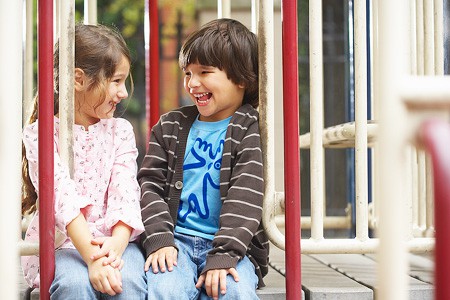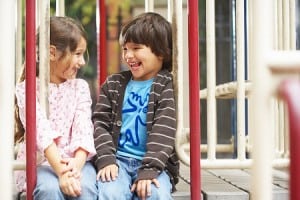Play dates and playground trips may seem like just a routine way to keep your little ones busy, but socialization is an important developmental tool. Every interaction your kid has helps him learn language skills, ways to cope with emotions and how to work within social norms. The concepts may seem technical, but socialization and healthy child development go together like peanut butter and jelly.
Socialization 101
Socialization starts when your baby is born and continues into adulthood, where it shapes each stage of development. Every play date, class, party and sport teaches your kids to manage stress, resolve conflict and fit into “the group.” “One of the most dramatic impacts on a child’s education is that of the socialization process,” says Ralph G. Perrino, who owns the North Virginia Tutoring Service and has a doctorate in education leadership. As a mom, you can help your kid process his interactions with other people, all of whom leave him with a lasting sense of his place in the world.
The Role of the Family
Your family provides your kid’s first lesson in socialization. “Stated simply, socialization is the process whereby individuals, especially children, become functioning members of a particular group and take on the values, behaviors and beliefs of the groups other members,” says Carolyn R. Tomlin, who has worked in early childhood education for 33 years.
Your shared values, religion and culture all give a reassuring structure to your young child’s early experiences. Developmentally, trust of the family is crucial for a secure and confident child. Children learn to trust as they watch you and your extended family show love, anger, joy and sadness and learn how to celebrate, disagree, work and play.
Early Childhood Socialization
Early childhood experiences outside the home can have a major impact on a child’s early socialization and make it easier for him to transition to school. Attending a library hour, playing on the playground or staying at Grandma’s house for a few hours can teach your little one how to listen to a teacher, separate from Mom or Dad and cope with other kids. Each interaction helps your child move more comfortably among social groups and adjust to changing environments. This makes for a happy, healthy kid and allows you to feel less anxious about watching him fly.
School and Development
Once your child is in school, teachers and peers start to be a major part of socialization, which impacts development by helping your child feel competent or incompetent. Kids listen, watch and perform tasks within a group, getting reactions to speech and behavior. This feedback from teachers and friends fosters confidence or contributes to low self-esteem. As a mom, you can help an insecure child by encouraging him to practice difficult tasks or just listening to the highs and lows of his day.
Peers and Identity
During early school years, a teacher provides structure and discipline in a child’s day. In adolescence, he’ll be more strongly influenced by his peers. Socially, spoken and unspoken codes of conduct, dress and speech are shaped by your kid’s friends and classmates. Developmentally, they’ll struggle with either “fitting in” or being true to their own identity. It also means they’ll try on behaviours from other groups, so if your kid comes home with a behaviour you’re not happy about, don’t be shy about saying, “That’s not OK with me.” Perrino confirms, “At this point in a student’s socialization process, teachers, parents and other adult role models play a vital role.” Moms can stay connected, listen without judgment and let kids express themselves through clothing, music and individual preferences.


